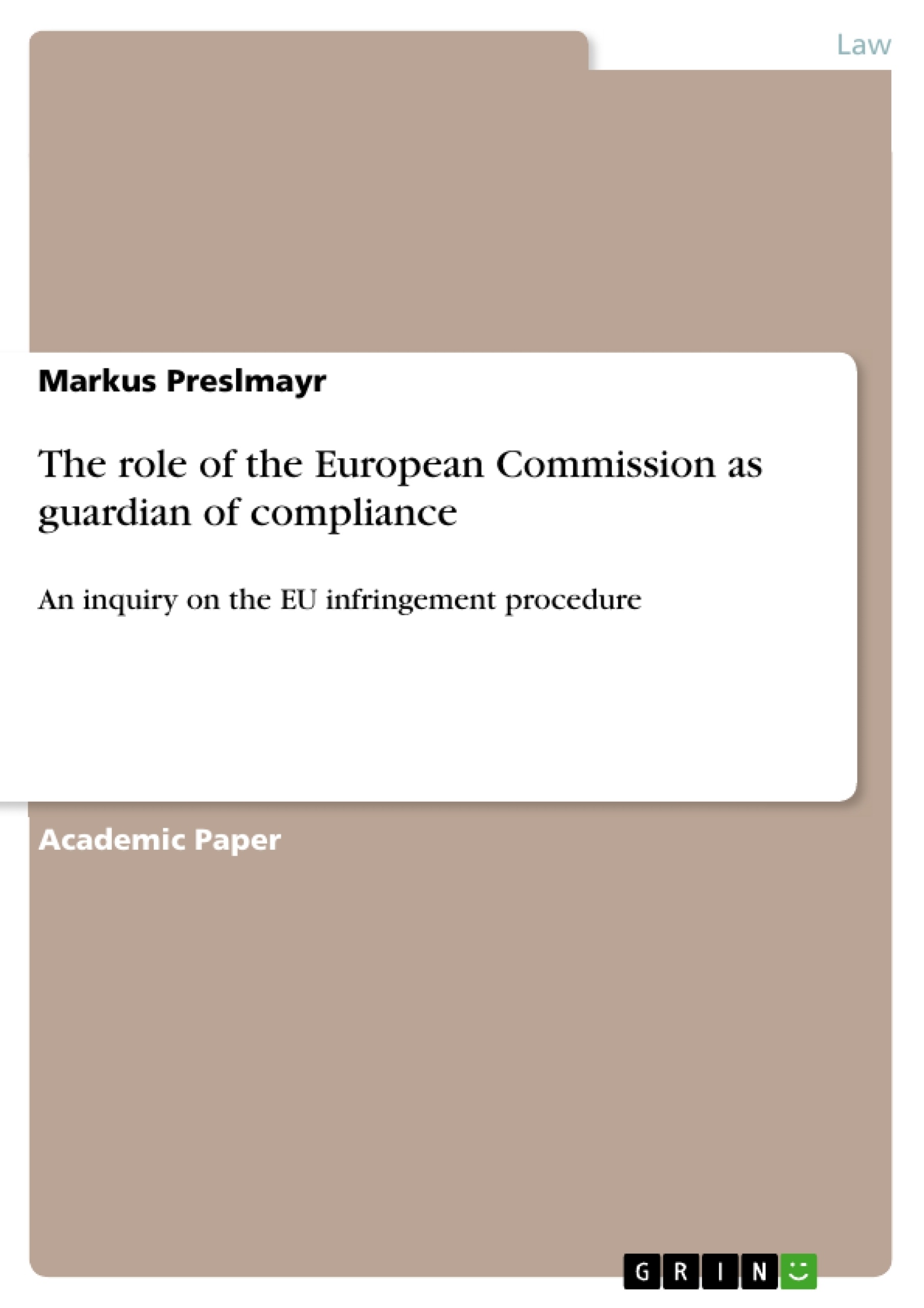This paper was originally designed as a research paper and aims to analyse both the legal nature and intention of the EU law infringement procedure. Thereby, the role of the European Commission has priority. A brief overview of effect and potential weak points of the procedure under Art. 258 TFEU will be provided. The essay deals likewise with alternative ways to ensure compliance and concludes with an insight into current legal and political challenges.
[German]
Diese Analyse der Rechtsnatur und Intention des Europäischen Vertragsverletzungsverfahren wurde als Studienarbeit verfasst und soll dem Leser einen kurzen Überblick über Wirkung und mögliche Schwachstellen des Vertragsverletzungsverfahrens nach Art. 258 AEUV geben. Die Arbeit behandelt auch alternative Ansätze der Rechtsdurchsetzung und zeigt überblicksartig aktuelle Probleme der Rechtsbefolgung auf Europäischer Ebene auf.
Inhaltsverzeichnis (Table of Contents)
- Introduction
- The EU infringement procedure in general
- Various enforcement strategies
- The CJEU and its role as an interpretation assistant: Preliminary reference rulings as a judicial implementation alternative
- Self-interests as the origin for selective acting?
- Monitoring compliance in practice
- Non-compliance as a European deficiency?
- The enforcement of fundamental values in the EU - current challenges and potential solutions.
- Conclusion and future prospects.
Zielsetzung und Themenschwerpunkte (Objectives and Key Themes)
This seminar paper explores the actions taken by European authorities to ensure that EU Member States fulfill their legal obligations under EU law. The paper focuses on the EU infringement procedure outlined in Article 258 TFEU and analyzes the role of the European Commission as a "guardian" of compliance and a facilitator for domestic legislators. It examines alternative strategies and mechanisms for achieving compliance and discusses the political aspects of monitoring compliance. The paper also inquires whether the EU faces a compliance problem, analyzing relevant academic literature on the topic.
- The EU infringement procedure as a mechanism for ensuring compliance
- The role of the European Commission as guardian of compliance
- Alternative strategies and mechanisms for achieving compliance
- The political aspects of monitoring compliance
- The potential for non-compliance as a European deficiency
Zusammenfassung der Kapitel (Chapter Summaries)
The introduction sets the stage for the paper, outlining its purpose, scope, and focus on the EU infringement procedure and the role of the European Commission. It emphasizes the significance of consistent transposition of Community law for the smooth functioning of the Union and its Member States. The paper then delves into the EU infringement procedure in general, explaining the legal framework and the roles of the Commission and the ECJ. It examines the preliminary stage of the lawsuit as a procedure of negotiation aimed at out-of-court conflict resolution.
Schlüsselwörter (Keywords)
EU infringement procedure, European Commission, guardian of compliance, enforcement strategies, CJEU, preliminary reference rulings, monitoring compliance, non-compliance, fundamental values, European integration, legal obligations, Member States, transposition of Community law.
Frequently Asked Questions
What is the EU law infringement procedure?
The infringement procedure, based on Article 258 TFEU, is a legal mechanism used by the European Commission to ensure that Member States fulfill their obligations under EU law.
Why is the European Commission called the "guardian of compliance"?
The Commission is responsible for monitoring whether Member States correctly transpose and apply EU law, acting as an enforcer and facilitator for domestic legislation.
What are alternative strategies to ensure EU law compliance?
Alternatives include preliminary reference rulings by the CJEU, which serve as a judicial implementation tool, and out-of-court conflict resolution through negotiation during the preliminary stage of a lawsuit.
What are the potential weak points of the infringement procedure?
The text analyzes whether selective acting based on self-interest or political challenges might hinder the consistent enforcement of EU law across all Member States.
Does the EU face a general "non-compliance" problem?
The paper examines academic literature to determine if non-compliance is a fundamental deficiency within the European Union and discusses potential solutions for enforcing fundamental values.
- Arbeit zitieren
- Markus Preslmayr (Autor:in), 2019, The role of the European Commission as guardian of compliance, München, GRIN Verlag, https://www.grin.com/document/494406



